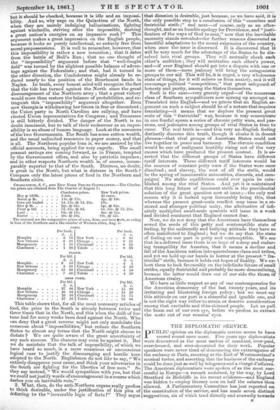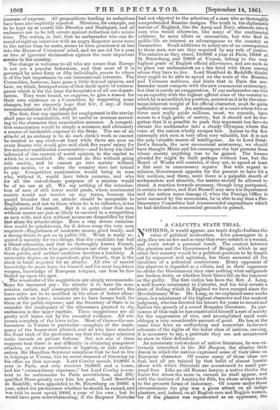THE DIPLOMATIC SERVICE.
PUBLIC opinion on the diplomatic service seems to have veered round once more. Five years ago diplomatists were denounced as the most useless of mankind, over-paid, over-housed, and over-decorated for their work. Popular speakers were never tired of denouncing the extravagance of the embassy at Paris, sneering at the Earl of Westmoreland's musical tastes, and asserting that the business of the embassy could be done just as well by telegrams and a chargé d'affaires. The American diplomatists were spoken of as the most suc- cessful in Europe—a remark endorsed, by the way, by Lord Stratford de Redcliffe in his recent evidence—and England was bidden to employ literary men on half the salaries then allowed. A Parliamentary Committee has just reported on the constitution of the service, and has made seven distinct suggestions, six of which tend directly and avowedly towards increase of expense. All propositions tending to reductions have been also implicitly rejected. Missions, for example, are to be kept up at courts like Dresden and Stuttgard, and all embassies are to be left secure against reduction into minis- tries. The notion, in fact, that an ambassador who can de- mand of right an interview with an angry Emperor saves more to the nation than he costs, seems to have penetrated at last into the House of Commons' mind, and we are rid for a year or two of ignorant declamation against the most important service in the country. The change is welcome to all who are aware that Europe is not yet a popular federation, and that most of it is governed by some forty or fifty individuals, access to whom is of the last importance to our international interests. The Committee, however, have gone a little beyond opinion, and have, we think, betrayed some of that facile spirit of extrava- gance which is for the hour the temptation of all our depart- ments. They were bound, we suppose, to give a reason for their own existence as a Committee, by suggesting some changes, but we sincerely hope that few, if any, of their recommendations will be adopted. The first, that any applicant for employment in the service shall pass an examination, will be useful or noxious accord- ing to the character that examination assumes. A competi- tive examination would be simply a nuisance, and ultimately a source of intolerable expense to the State. The use of an attache at an embassy is to do such clerk's work as cannot be trusted to any clerk—at least while there are men on every Bourse who would give said clerk five years' salary for five minutes' confidential conversation—and to keep his chief informed of the current of social opinion, in the capital to which he is accredited. He cannot do this without going into society, and he cannot go into society without private means, or a salary the country does not intend to pay. Competitive examination would bring in men who, without it, would have taken curacies, and who for all the out-of-doors purposes of a mission would be of no use at all. We say nothing of the introduc- tion of men of still lower social grade, whom continental society would not receive on any terms, because the quaint blunder that an attache should be acceptable to Englishmen, and not to those whom he is to influence, is too deeply rooted for assault. But it is quite clear that men without means are just as likely to succeed in a competition as men with, and men without means are disqualified by that fact alone for attaché-ships. Even a very severe examina- tion would be mischievous, for it drives away the very men required—Englishmen of moderate means, good family, and a strong desire to get on in public life. What is really re- quired is security for two things, that the candidate has had a liberal education, and that he thoroughly knows French. All the diplomatists who gave evidence are clear upon both these points, and neither condition involves a hardship. A university degree, or its equivalent, plus French, that is the stock in trade required for an attaché. All else of special knowledge he must learn for himself, and his most important weapon, knowledge of European tongues, can best be fur- bished up upon the spot. The remainder of the suggestions are simply recommenda- 'Nona for increased pay : the attache is to have his com- miision earlier, and consequently his pension earlier; the leave rules are to be modified in the sense of better allow- ances while on leave ; missions are to have houses built for them at the public expense; and the Secretary of State is to consider the inadequacy of the allowances granted to the embassies in the larger capitals. These suggestions are all pretty well borne out by the recorded evidence. All wit- nesses complain of the leave rules. Most of them—the am- bassadors in Vienna in particular—complain of the inade- quaey of the house-rent allowed, and all who have reached the front rank of the profession say that the larger missions make inroads on private fortune. But not one of them suggests that there is any difficulty in obtaining competent attaches, or clever secretaries of legation, or able ambas- sadors. Sir Hamilton Seymour complains that he had to live in lodgings at Vienna, but he never dreamed of throwing up his office on that account. Lord Cowley spends 13,0001. a year in Paris, and only receives 10,0001. and a house, and his " extraordinary expenses ;" but Lord Cowley is con- tent to be ambassador to Paris nevertheless, and fifty qualified Peers greatly envy him his post. Lord Stratford de Redcliffe, when appointed to St. Petersburg on 70001. a year, asked his predecessor whether he should be ruined, and was told he must spend 10001. a year of his own ' • but he would have gone notwithstanding, if the Emperor Nicholas had not objected to the selection of a man who so thoroughly comprehended Russian designs. The truth is, the diplomatic service of England, like the Army and Navy, attracts into it men who would otherwise, like many of the continental noblesse, be mere idlers or sensualists, but who find in public life an interest as advantageous to the country as themselves. Small additions to salary are of no consequence to these men, nor are they required by any rule of justice. The salaries as they stand, 10,000/. a year at Paris, 70001. at St. Petersburg, and 7000/. at Vienna, belong to the very highest grade of English official allowances, and are such as to place our ambassadors on a fair level with those among whom they have to live. Lord Stratford de Redcliffe thinks they ought to be able to spend on the scale of the Russian and Viennese noblesse, and hints that in Paris the am- bassador must compete with the new commercial aristocracy, but that is surely an exaggeration. If our ambassador can live on an equality with the highest official class of the country to which he is accredited,his position, assisted as it is by the enor- mous inherent weight of his official character, must be quite sufficiently secured. An ambassador at a court where two or three men really guide millions, must, we concede, have access to a high grade of society, but it should not be for- gotten that it is possible to push this argument too far—to elevate the ambassador into a cloudy Olympus, where the voice of the nation wholly escapes him. Access to the few extremely rich men is very often very valuable, but it is not the only valuable source of intelligence. As to Lord Strat- ford's friends, the new commercial aristocracy, we should have thought Mires and his comrogues the last persons from whose society anything was to be gained. The houses pleaded for might be built perhaps without loss, but the Board of Works will contrive, if they are, to spend at least a fair rent in unnecessary repairs. But with regard to salaries, Government appears for the present to have hit a fair medium, and there, until there is a palpable dearth of ambassadors and attaches, the matter should be allowed to stand. A reaction towards economy, though long postponed, is certain to arrive, and Earl Russell may save his department and the nation some damage if, when the Foreign Office is next menaced by the economists, he is able to say that a Par- liamentary Committee had recommended expenditure which he had declined on economical grounds to permit.































 Previous page
Previous page